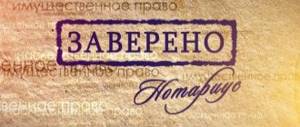Types of gift agreements
In essence, the agreement is an official confirmation of the fact of the gratuitous transfer of property. The transaction can be executed both without a notary and with one. Naturally, the participation of a notary in this transaction has a number of advantages. For example, he acts as a witness to a transaction. If any disputes arise between the donee and the donor that are resolved through the court, the notary will confirm the fact of the donation on a voluntary basis. If for some reason a participant in a transaction has lost a contract certified by a notary, he will be able to obtain a duplicate without any problems.
There are three main types of gift agreements. All of them are confirmation of the gratuitous transfer of property. However, they have certain differences:
- Real contract . It can be concluded not only between relatives, but also between strangers. Its main difference is that a person wants to donate property, immediately completing the transaction. After this, the new owner has the right to dispose of the property at his own discretion.
- Contract of promise of gift . After concluding this agreement, the donee will be able to dispose of the property after a certain time. In such an agreement, it is necessary to accurately indicate the object of the donation and the details of the donee. Without this information, the document will be considered invalid. In addition, you will need to indicate exactly when the donee will receive ownership. This may be a specific date, but not the death of the donor. Do not be confused, because if you plan to transfer the apartment after death, it is necessary to draw up not a deed of gift, but a will.
- Donation agreement . In this case, the property is transferred for use for general purposes. As a rule, such donations are received by legal entities. If the donee is an individual, the document must indicate what exactly needs to be done with the object in the future. At the same time, the new owner is obliged to prove in the future that the use of the property is carried out strictly in accordance with the agreement. Documents that take into account all transactions performed in relation to this property are suitable for this. If the new owner cannot prove the use of the object for its intended purpose, the contract may be terminated in court.
Documentation
Depending on the situation, in addition to the main list of documents, additional ones may be needed. To clarify this, it is recommended to contact a notary in advance, who, having considered your specific case, will provide a complete list of necessary documents. If, for health reasons, one of the parties to the transaction cannot come to the notary’s office in person, a notary can be called to your home. The main condition is that the donor must be in full mental health and understand the consequences of such actions.
You also need to remember that both parties must provide only original documents. The main list looks like this:
- Passports of both parties. If the recipient does not yet have a passport, a birth certificate must be provided. Donees under eighteen years of age, in addition to their documents, must provide the passport of one and their guardians or parents.
- A document confirming the registration of the apartment. This may be a certificate or an extract from the Unified State Register. Such documents must be kept by the donor. Without them, he will not be able to confirm ownership.
- Foundation agreement. This document determines on what basis the donor is the owner of the property. For example, these could be sales contracts, a certificate of privatization or inheritance.
- Real estate registration certificate. The donor can order it from the BTI.
- If the donor is married, written permission from the other spouse will be required. Moreover, this permission must be notarized.
- Extract from the house register. It is necessary in order to know who is registered in a given living space.
- If there are minor children registered in the apartment, this transaction will require written permission from the guardianship authorities;
- If the interests of one of the parties are represented by a trustee, it is necessary to have a power of attorney certified by a notary. You will also need a passport of a trusted person.
Is tax paid?
Donating an apartment between close relatives does not require payment of income tax. This is stated in paragraph 18.1 of Art. 217 of the Tax Code of the Russian Federation. The only expenses that the parties will bear are payment of the state fee for registering the agreement and notary services (when certifying the document). In this case, the recipient of the apartment will be able to sell it without paying a tax of 13% only after three years from the date of entry into force of the agreement.
To avoid paying tax, you will need to collect documents that indicate close family ties between the parties to the transaction (marriage certificate, birth certificate, etc.). In other cases, it will not be possible to avoid paying a tax of 13% .
How to draw up an apartment donation agreement
There should be no difficulty in filling out the document yourself. Download and print the apartment donation agreement form. You will see that everything is extremely simple here. It is enough just to indicate the necessary information in the appropriate fields. However, after filling out the document, you need to take care of its correct formatting.
The Civil Code does not prohibit participants in a transaction from drawing up a gift agreement in writing without the participation of a notary. However, here you need to take into account negative factors:
- controversial issues. Resolving any conflict that arises between the parties will be quite difficult. With such an agreement, you are not protected from unlawful acts;
- the contract can be challenged. If desired, one of the parties has the opportunity through the court to declare the contract invalid. After all, there is no evidence that the participants were sane when drawing up a written agreement.
After representatives of both parties have collected all the necessary documents, you need to perform the following steps:
- Come to the notary's office in person to hand over all the documents.
- The notary will draw up several copies of the agreement . All of them are signed by the parties to the transaction in the presence of a notary. The presence of a minor recipient of the gift is not necessary. After all, one of the parents, trustee, or guardian must sign the documents instead. All participants in the transaction are given one copy. Also, for the archive, one copy remains with the notary.
- The party that accepts the gift receives an official document drawn up on a special form that has watermarks . Copies intended for the donor and the notary are drawn up on plain paper.
- After the notary has certified the contract, he is obliged to submit it for registration on the same day . This procedure is handled by the notary office itself, since these services are included in the total cost. The law prohibits notaries from charging additional fees for these services. Documents are transmitted electronically. Thus, registration is carried out within one day. If for technical reasons it is not possible to transfer electronic documents, notary assistants personally take the documents to Rosreestr. In this case, the registration period may be extended to three working days.
- The procedure for submitting documents for registration is free . But the parties have the right to refuse it. As a rule, in this case, the donor submits a package of documents for registration independently.
- Participants in the transaction are required to pay state duty. The amount to pay will be less if registration documents are provided electronically. Typically, these costs are borne by the recipient of the gift. Although the notary does not care who exactly will pay for this service.
The final stage of the transaction is payment of tax. This obligation is assigned to the donee if he is not a close relative of the donor. The tax amount is 13 percent of the total value of the property. Since the donor has no benefit at all from this transaction, he does not pay any taxes. Only the recipient receives the benefit.
Registration procedure
When registering, you need to pay attention to three important points. First, the methods you can use when submitting documents
There are several of these today. Secondly, documents and timeliness of their preparation. And thirdly, the procedure itself, the order of which must be followed in accordance with established rules.
The law establishes three methods of transferring documents for registration, each of which is determined taking into account the degree of personal participation of the applicant:
- Contact the registration authority or specialized center. In this case, the applicant personally submits the necessary documents, writes an application in the appropriate structure and receives a receipt. In the same way, a certificate of registration will be obtained.
- Use of an electronic resource. There are special portals, as well as a government services website, where you can select the tab on registration of rights, enter the required information, upload scanned copies of documents and submit an application. For this method, it is necessary to have an electronic signature, which confirms the application from the citizen.
- Outdoor event. It is possible to invite a specialist to your place, but this service will require additional payment, which will depend on the region. In addition, not every subject of Russia, namely its territorial registration authorities, can offer such a service.
A citizen has the right to use any of the proposed options; the law does not limit this possibility in any way and does not determine the most preferable method of registration.
Rosreestr allows you to make an appointment to save time when submitting documents. This should be done either by visiting the authority in person or by telephone.
Regarding the registration procedure, it does not provide for a large number of actions on the part of the applicant. After the documents have been prepared, which is the first and main stage, they must be submitted to the registry. Here comes the step to select the appropriate method for sending the documentation. As mentioned above, a citizen has the right to any option, but it must be remembered that he will still have to receive an extract from the register in person.
When papers are handed over in person, the citizen must receive a receipt that will reflect the fact that the documents were accepted and the date when they can appear for an extract.
Then all actions pass to the registration authority. He accepts papers and reviews them based on the information provided.
This will be the basis for satisfying or rejecting the registration requirement. A decision is made within ten days; if the application was made to specialized centers, the procedure will be reduced to approximately two days. This gives centers an advantage over the registration authority, as it significantly saves time.
Registration may also be refused. Usually the reason for this is the lack of necessary documents or some information in them. In such a situation, the applicant will receive a notification and will be given the opportunity to correct the error or resubmit the papers. If the requirement is satisfied, the information will be entered into the register and an extract from it will be issued. A document of title is always issued only in paper form and has a special number.
Thus, in order for a gift agreement to be concluded and legal consequences to occur, it is imperative to contact the registry, where the rights of the donee will be registered and a document confirming this fact will be drawn up.
Content
Almost all the terms of the contract are already indicated in the form. Here, the participants in the transaction only have to fill in the missing information. The passport details of both parties to the transaction are indicated. The places of their permanent residence should also be noted. Detailed information about the apartment, which is the object of the transaction, must be entered. All data should be taken from official documents that government services issued for this property.
Naturally, you can only give away an apartment that has no heirs, other owners, or collateral. If the interests of one of the parties are represented by a proxy, his passport details are also indicated in the document. If this is not done, the contract may be declared invalid through the court.
Features of the gift agreement
When the donor transfers ownership of an apartment, he has the opportunity to put forward certain requirements. For example, the recipient of such a gift would be required to use the property in a manner that would benefit the community. In turn, the donee can also set conditions. For example, he has the right to refuse such a gift. He is also allowed to re-donate property, acting as a donor.
The deed of gift is an official confirmation that the property is transferred without monetary compensation. If the transaction involves the transfer of funds from the donee, this is considered a sham transaction. Its participants may be punished to the fullest extent of the law. Such a donation cannot be called gratuitous, which means it is not legal.
What should be indicated in the deed of gift?
An apartment donation agreement between close relatives is drawn up only in the presence of both parties. You can download a sample agreement from the link at the end of the article.
What data must be included in the document in 2020?
- At the top of the sheet in the middle they write the name of the document - “Apartment Donation Agreement”. Then indicate the date and place of writing the document (city, village, district);
- passport details of both parties, including their registration information and dates of birth;
- information about the apartment (address, floor, living and total area, internal condition of the premises, type of materials used in decoration);
- details of documents that establish ownership of the transferred apartment;
- the cost of residential premises (real, market) is indicated at will;
- an indication of the authorities that will register the donation transaction and the date of registration;
- other information that is usually included in every purchase and sale agreement;
- signatures and full names of both parties.
Donation between close relatives is always free of charge, so drawing up a separate act of acceptance and transfer is not required. Any indication of compensation will make the deed of gift void, that is, without legal force.
As additional information, the donor’s right to annul the transaction upon the death of the donee is sometimes indicated. If desired, enter the date of the transaction and the date of transfer of ownership of the apartment.
Important! After drawing up, the deed of gift is submitted for registration to the Federal Registration Service office.









